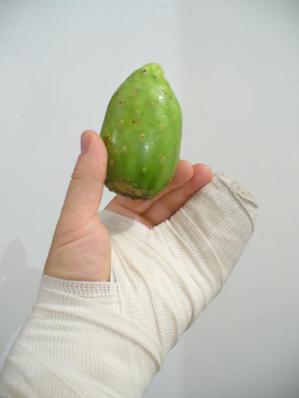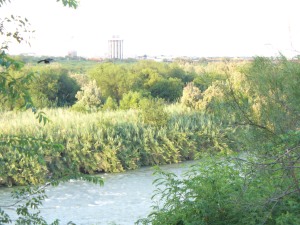Ever since I can remember, I have seen steps as kind of a wasted resource. I tend to only use every second or third one, is what I mean. And when I am busy, I really move fast up steps. This is what happened last Thursday morning at FVP: arrived at office, ran up the steps, slipped, dived heroically to save defenseless laptop, and landed on one of my fingers.
My friends and family would express surprise that it has taken this long for me to break something running up steps, so I will begin by agreeing that this might be a case of karmic backlash.
Strangely, my hand didn’t hurt that much. I brushed myself off, opened up my computer and started to check my e-mail. When I looked down at my hand, it looked like one of those signposts where three signs are pointing right and one pointing to an awkward fork in the road. Yikes. This was not a good sign. One of my coworkers offered to take me over to the hospital.
The receptionist in the emergency room distinguished herself with her sincerity and command of linguistic nuance. When asked how long the wait might be, she smiled and said, “Va a tardar un pooooco” – it’s going to take liiiiittle while. This phrase simultaneously meant 1) officially, I can tell you how long it will take, but 2) you may be here for an eternity. In a second bout of sincerity, she revealed to us that the hospital’s x-ray machine was actually broken. So we politely stepped out to reconsider the options. An illuminated sign reminded me that the phrase in Spanish for “emergency room” – sala de urgencias – translates literally to “urgency room”. This had always struck me as a little funny, in a non-participatory way.
It didn’t take long for my coworker to convince me to go to a private hospital down the road. I would probably leave the hospital with a case of privilege-induced guilt, but they would take care of me, and quick. So we went in, I paid my entrance fee, and within fifteen minutes I was spreading my fingers out under an x-ray machine. Soon after the doctor had a film of my skeletal hand up on the illuminated board, my own version of the day of the dead. The doctor confirmed that I had broken the ring finger on my left hand
(the third metatarsal?) and told me that I needed a cast.
He told me that it was not his specialty to fix broken bones, so please wait for the traumatólogo.
The traumatologist? I love how Spanish makes a word out of everything. While I waited, I remembered the Nuevo Laredo neighborhood called Doctores, where all the streets are named after medical specialists. I kid you not. Calle de Endocrinólogo, Oftalmólogo, Reumatólogo, etc . Can you imagine the exchanges? (“Oh, no way, Pedro, you grew up there? My cousin used to live on Gynecologist Street!”)
The trauma doctor was a friendly guy who – as you might expect – cracked morbid jokes about every 30 seconds in both Spanish and English. He was born in the United States, he said, but he grew up in Nuevo Laredo. His mother had traveled across the border to Texas to give birth to him and all but one of his siblings. Five years ago, and already in his late forties, he moved his family over to the Texas of the border. He lived there, and commuted to work in Mexico –the opposite of the typical trajectory.
So here I am, mostly fine but with a cast halfway up my arm. I get a lot of attention from strangers – having a cast is a good icebreaker (only figuratively). And interpretations from friends are starting to come in; one friend commented that a broken left ring finger is a sure sign that I’m not supposed to marry anyone in Mexico.
It’s kind of tough to wash dishes, unscrew caps, and type. I’ve never been that fond of doing dishes or unscrewing caps, but I do need to be able to type. So I trained my computer in voice recognition, reading in my best newscaster voice excerpts from The Problems of Philosophy by Bertrand Russell and a children’s book. The voice recognition is mostly accurate, amazingly. When I accidentally start speaking Spanish with the headphones on, it starts kicking out text that sounds like either avant garde poetry or the English on the back of a pirated Japanese t-shirt:
You also anonymous and being on a stool be no Cassandra be on a mano that dominate cold and hot idea it has come into
That’s the computer’s translation of me saying in Spanish, “I’m just a silly gringo who broke his hand running up the steps.”
Next post: The one-armed fishermen
To help support my work in Nuevo Laredo, you can chip in here:
http://brendan.chipin.com/kiva-fellowship-mexico
To see all currently fundraising loans from FVP on Kiva.org, please click here.


